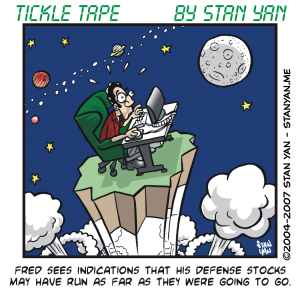With the New Year upon us, it’s time to make plans for the future, and set exciting new goals. Goals can be motivating. When we think of where we want to go next in our lives, and when we formulate specific goals, the goals suddenly seem possible. We start thinking of various possibilities. The more we think, the more plans we make, and the more the possibilities seem realistic. We suddenly feel energized and ready to take on the world. But it’s important to not get too carried away. Whether you are making plans for your personal life or setting new trading goals, you must set goals carefully. It’s vital that you set realistic goals, goals that are challenging enough to take you to new heights, yet humble enough to match your actual available resources.
At the start of the new year, it’s tempting to be extremely optimistic. Why not shoot for the stars? Although high aspirations are necessary for one to achieve ambitious goals, “shooting for the stars” usually leads to unrealistic goals, and that usually leads to failure. For example, about 90% of the people who set New Year’s resolutions fail. Most of these failures occur because people were too optimistic when setting their goals. They started to think, “anything is possible” if one “dares to dream.” As inspiring as the “anything is possible” attitude is, it rarely proves true. You can’t merely think your way into success. It takes hard work and planning. And all the hoping in the world can’t make one achieve the impossible. You must have the proper resources.
Most people set unrealistic goals when making a New Year’s resolution. They think they can lose more weight than they really can lose. They tend to want to achieve personal projects that can’t possibly be completed with the resources they have available. And when it comes to trading, many novice traders plan on making more money than they can possibly make. (For example, one can’t hope to make a living with a $10,000 trading account.) Instead of setting goals that are difficult to achieve, it’s essential to set realistic goals. Don’t think you can trade profitably if you are just starting out, for example. Give yourself some time to hone your trading skills. (Many seasoned traders say that if you’ve been trading for less than five years, you are still a newbie. Keep that in mind when you plan your trading goals.)
When setting goals, it’s useful to make them specific, but not unrealistic. It is useful to distinguish learning goals from performance goals and set both kinds of goals. A novice trader, for example, doesn’t have the skills and resources to trade consistently or make big profits. Setting the goal of making a 40% profit in six months, for example, is difficult if one doesn’t have the requisite skills. That’s an example of setting an impossibly high “performance goal.” Unrealistic performance goals usually lead to failure and extreme disappointment.
This is when hopes are dashed, and most want to just give up. Instead of setting a high-performance goal, novice traders should set high learning goals. A learning goal, such as spending 20 hours a week learning new strategies and putting on 10 practice trades (whether profitable or not), is easier to achieve. One will be likely to achieve success and meet the goal. Rather than feeling a sense of disappointment, one will feel accomplished, as if he or she has beaten the odds and triumphed. One will be energized and ready to move on to achieve even higher goals.
The start of the new year is a great time to set new and exciting goals. But be careful. Set realistic goals that you know you can achieve. For the New Year, many people set their sights too high, fail, and experience extreme disappointment. By setting realistic goals, however, you’ll be more likely to achieve success, feel energized, and maximize your potential.


